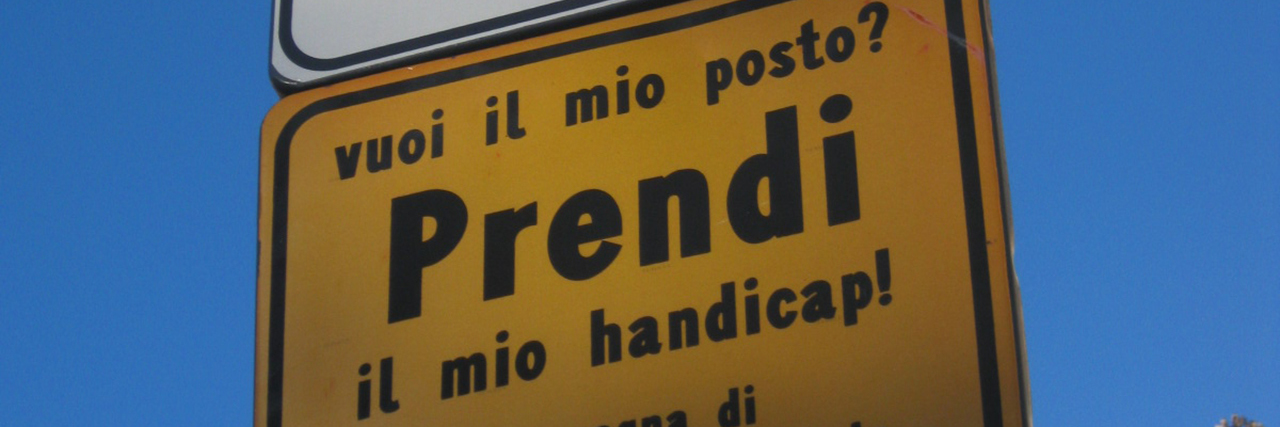Last year, my husband and I went to Italy for a wonderful family reunion. It was great to see family and friends after so many years. Much as I enjoyed the trip and was focused on family, being Italian-American with a disability, I have always had an abiding interest in cross-cultural views of disability. I’m not a wheelchair user, but signage regarding wheelchair access is probably the easiest thing to find in any country and can give clues as to a country’s take on disability in general.
In the small, southern medieval town of Agropoli, I found a parking space marked with the universal wheelchair symbol in the familiar blue. But something was different from what we see here in the States. Under the wheelchair symbol in yellow was an additional sign asking “Want my space? Get my disability! Social Awareness Campaign, Department of
Social Solidarity.” A little blunt maybe, but it sent a message. I was first and foremost gratified to see that it was spelled out that a person’s right to the space was supported by an official entity. Too often I think we forget that a person’s right to a disabled parking space is the result of hard fought legal issues and not a question of convenience or luxury. Hence why people may try to take the space “just for a quick trip” without thought to whether or not they have that right. So the endorsement lends a certain validity that I don’t think is appreciated fully in many countries. The second sign makes the issue a matter of equity among citizens.
I don’t have mobility issues of any kind to prevent me from going about my daily routine unassisted, and I admit I have been envious of those spaces. Anyone who lives in Los Angeles knows that life revolves around driving, and parking is everyone’s worst nightmare, next to gridlock. I have circled
parking lots and eyeballed empty accessible parking spaces for what felt like the millionth time, barely admitting to myself I wished I could legitimately sneak my car into the space and get on with my needed errand.
But I haven’t, for a couple of reasons — my mom and my dad. Both of them acquired age-related disabilities. My father acquired cardiovascular disease, which among other things caused him to need to use the accessible parking spaces first so he wouldn’t have quite so far to walk and could save his energy and risk of falling. Later, towards the end of his life, he needed the parking so he could get in and out of his wheelchair comfortably — a necessity if he wanted to go out at all.
My mom could use the spaces. She still drives, but persistent vertigo and mobility issues make her at risk for falling and fatigue. She tells me she refuses to use the disabled parking spaces though — and she told me why. Though one day she may absolutely need those spaces, as long as possible she wants to keep them open for people she feels need them more. That’s her choice. That’s her vision of equity for all.
She also told me this story. When my father was ill and unsteady on his feet and in possession of a disabled parking placard, but still mobile enough to not need a wheelchair, they went out to do the grocery shopping — an errand he enjoyed. They attempted to find a disabled parking space so my father would not have to walk far. They found one almost directly in front of their store, but it was occupied. Inside the car devoid of any disabled placards was a young man chatting on a cell phone. My mom did not stop, but continued circling and found another spot farther away from their store.
As my mom helped my dad walk across the lot, they passed by the same car with the young man still chatting away. My mom, an immigrant and second language speaker, did something she usually tries to avoid — she confronted the young man. “Why you parked here? My husband needs this spot because he cannot walk well.” The young man startled at my mom’s disapproving tone and glanced at my dad just behind her holding his
walker for support, fatigue and discomfort already lining his face. He dropped his phone, faced flushed. “Oh I’m sorry, I’m sorry,” he mumbled as he clumsily placed his car in reverse and left the parking lot.
If you are able-bodied, please consider the equity those spaces are designed to provide. Don’t look to an official injunction from a government entity to tell you if you merit the spot. Don’t wait for a stranger to tell you that you don’t. If you are unsteady on your feet or a wheelchair user and need those spots to live your life, use them as you see fit — it is your right. Share your need for those spaces when you have a chance. Personalizing the access those spaces provide makes able-bodied people less likely to use them indiscriminately.
If you need the space, use it. If you don’t, leave it. Everyone will have a better day because of your actions.
We want to hear your story. Become a Mighty contributor here.

